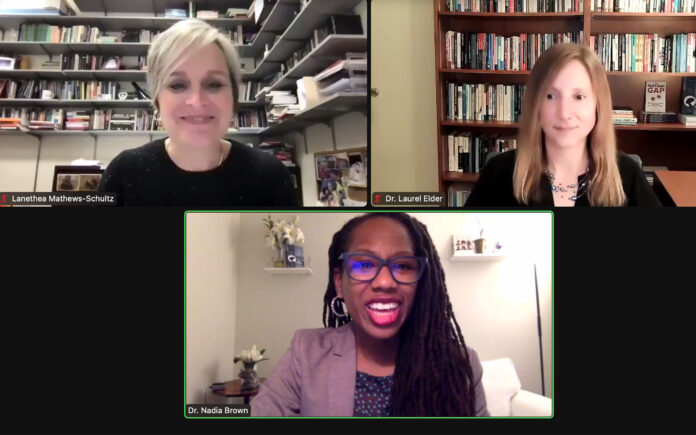On Feb. 21, Muhlenberg’s Political Science department held the “Women, Representation & the 2022 Elections” webinar as a part of their 2022 midterm election series. The event’s speakers included Professor of Political Science at Hartwick College Laurel Elder, Ph.D., and Professor of Government and Chair of the Women’s and Gender Studies Program at Georgetown University Nadia Brown, Ph.D. Elder’s book “The Partisan Gap” and Brown’s work “Sisters in the Statehouse: Black Women and Legislative Decision Making” and “Sister Style: The Politics of Appearance for Black Women Political Elites” have won awards for their advancement in the field. The webinar was moderated by Professor of Political Science Lanethea Mathews-Schultz, Ph.D.
Elder began the talk with a presentation about her research. Her primary research question examines why Republican women have a harder time getting elected than their Democratic counterparts. Elder noted several reasons why this might be the case including the fact that women have a more difficult time viewing themselves as elected officials, that the two parties are more ideologically polarized than ever, there have been regional and racial realignments within the parties and both parties have contrasting power structures. Elder noted that “this dramatic partisan gap among women in elected office is likely to remain a characteristic of our politics for I think probably decades to come.”
“I think the partisan gap grew bigger in 2022, despite it being a good year for Republicans.”
Laurel Elder
Brown’s work explores similar topics on representation but focuses on what she calls the “politics of appearance,” specifically in relation to Black female political elites. Beginning her talk, Brown expressed how she was discouraged by her advisors during graduate school to study Black women politicians. She explains that this was because, according to her advisors, “Black women political elites look all the same on paper.” Brown decided to counter this by centering her writings on the political impact of Black women’s hair. According to Brown, voters have “cues about what they think a Black woman will do when they’re elected to office based on their hair texture and their hairstyle. So, if they have a more Afrocentric hairstyle which are locs or braids, they’re seen as being more Afrocentric than if they have straight hair.” According to Brown, hair as an aspect of identity provides both agency and pre-determinism; with individuals having a genetic predisposition for their hair type but also the agency to alter their hair. Brown is also a big advocate for Black women’s representation in the field of political science, noting that their experiences often go unappreciated in this sect of academia.
The webinar concluded with a Q&A portion where students were allowed to submit questions for the speakers. The group discussed the lasting impacts of the Supreme Court’s Dobbs decision, former South Carolina Governor Nikki Haley’s presidential campaign and Vice President Kamala Harris’s low approval ratings.
AJ Henley ‘24, a student in Gender, Politics & Policy, expressed their thoughts on the event saying, “the webinar was insightful. I already knew a fair amount of what they were talking about from our class, but I appreciated both guests providing more details of their research.”
Katie is a Media & Communication and Political Science double major in the class of 2024. When she's not working on the paper you can find her blasting Taylor Swift, reading Jane Austen, or crying over Little Women (2019).























